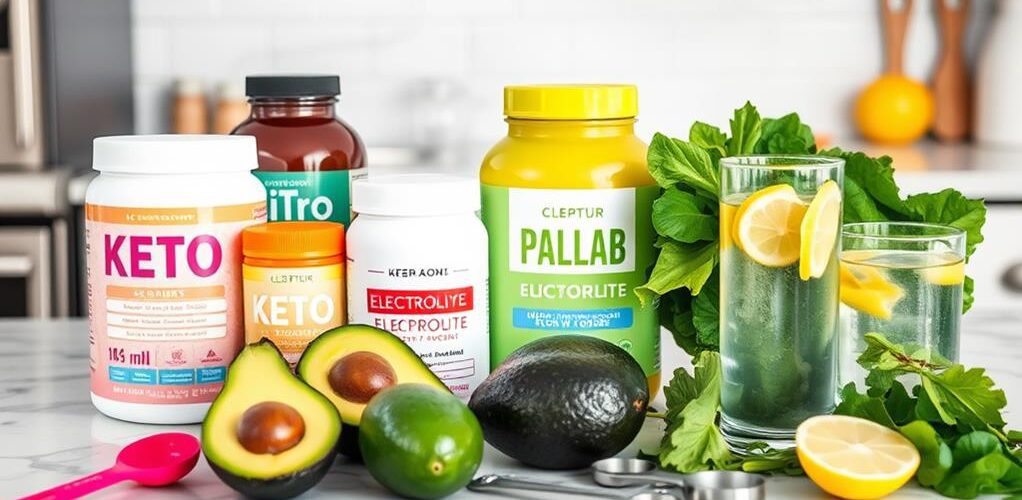
Stay hydrated in ketosis with outstanding electrolyte supplements like LMNT Electrolyte Drink Mix and Dr. Berg's Electrolyte Powder. These blends pack in the essential minerals you need—sodium, potassium, and magnesium—to ward off muscle cramps, headaches, and the dreaded "keto flu." Hi-Lyte Electrolyte Capsules and Keto Chow Electrolyte Drops are also great, offering convenience and hydration without packing on carbs. Even simple options like sea salt, avocados, and leafy greens can help. Keeping those electrolytes balanced not only powers your workouts but also keeps you feeling fantastic. Want more tips on mastering the keto lifestyle? There's lots more to discover!
Key Takeaways
- LMNT Electrolyte Drink Mix: Offers balanced sodium, potassium, and magnesium with zero sugars or carbs, ideal for keto hydration.
- Dr. Berg's Electrolyte Powder: High potassium content with no artificial ingredients, supports keto-friendly hydration.
- Hi-Lyte Electrolyte Capsules: Convenient capsules providing essential electrolytes, suitable for maintaining ketosis.
- Keto Chow Electrolyte Drops: Bioavailable liquid electrolytes, easy to add to water, and carb-free.
- Swigg Electrolytes Powder Packets: Sugar-free daily hydration packets, convenient for on-the-go electrolyte replenishment.
Importance of Electrolytes
Understanding the importance of electrolytes is essential for anyone following a ketogenic diet. Electrolytes are significant minerals that help keep your body's fluids balanced, nerves signaling, and muscles contracting. On a keto diet, it's especially important to maintain this balance.
Why? Because when you cut down on carbs, your insulin levels drop, causing your kidneys to flush out more sodium and potassium. This can leave you feeling drained and cranky, not to mention the dreaded "keto flu."
To keep your electrolyte balance in check, you need effective hydration strategies. Drinking water is good, but it isn't enough. You also need to replenish sodium, potassium, magnesium, and calcium. These minerals help you stay energized and avoid those annoying muscle cramps and headaches.
Think of them as the secret sauce to making your keto journey smoother and more enjoyable. It's not all doom and gloom, though. By paying attention to your electrolyte intake, you can help your body adapt to ketosis more comfortably.
Symptoms of Electrolyte Imbalance
Maintaining proper electrolyte balance is not merely a recommendation but a necessity on the ketogenic diet. When you're in ketosis, your body loses a lot of water and, with it, essential electrolytes. This can lead to a range of symptoms known as the "keto flu."
Imagine waking up with muscle cramps that feel like a charley horse marathon, or suddenly feeling dizzy and exhausted for no apparent reason—these are signs that your electrolytes might be out of whack.
Low sodium levels can cause hyponatremia, leading to confusion, headaches, and in severe cases, seizures or even coma. Not fun!
Potassium is another big player; without enough of it, you might experience muscle weakness, irregular heartbeats, and a higher risk of hypertension.
Magnesium deficiency is also common and can result in insomnia, anxiety, and—you guessed it—more muscle cramps or spasms.
Tracking your electrolyte intake is essential. Without enough electrolytes, not only might you feel lousy, but your weight loss efforts could also hit a wall.
Natural Electrolyte Sources
On the ketogenic diet, securing your electrolyte balance through natural sources is fundamental for ideal health and performance. Electrolyte rich foods not only help you stay hydrated but also guarantee your body functions at its best.
Natural hydration sources like sea salt and Himalayan pink salt are great for maintaining sodium levels, which is imperative for fluid balance during ketosis.
Avocados are a powerhouse of potassium, offering about 975 mg per fruit. This makes them an excellent choice for keto dieters, supporting muscle function and preventing cramps.
Leafy greens such as spinach and Swiss chard are high in magnesium. One cup of cooked spinach delivers around 157 mg of magnesium, essential for sustaining energy levels and reducing fatigue.
Nuts, especially almonds, are also a fantastic source of magnesium, containing about 76 mg per ounce. They can help mitigate symptoms of the keto flu, making them a valuable addition to your diet.
Foods like broth and pickles not only enhance flavor but also provide significant sodium, contributing to overall electrolyte balance, which is imperative for those on a ketogenic diet.
Choosing Supplements
While natural electrolyte sources provide an excellent foundation for maintaining balance on a ketogenic diet, supplements can offer additional support to guarantee ideal levels are sustained. Choosing the right electrolyte supplements is vital to avoid disrupting ketosis while ensuring your body gets the necessary hydration and muscle support.
Focus on ingredient quality when selecting products; prioritize those with minimal artificial ingredients and fillers. High-quality, natural components not only enhance health but also improve the supplement's effectiveness. The form of the supplement—whether powders, pills, or liquids—should fit your lifestyle and preferences for convenience and adherence.
Additionally, always check nutritional labels for low or zero carbohydrate content. Avoid supplements with added sugars or non-keto ingredients to maintain the integrity of your diet. A balanced mix of sodium, potassium, and magnesium is essential, as these electrolytes are important for maintaining hydration and muscle function in ketosis.
Here's a quick comparison of different supplement forms:
| Supplement Form | Pros |
|---|---|
| Powders | Easy to mix with liquids, customizable dosages |
| Pills | Convenient, portable, no taste |
| Liquids | Fast absorption, easy to drink |
| Capsules | Convenient, often minimal fillers |
| Effervescent Tablets | Easy to dissolve, pleasant taste |
Sodium on Keto
Sodium is super important on the keto diet because when you cut carbs, your body loses more sodium.
Experts often suggest getting between 3,000 to 5,000 mg of sodium daily to avoid feeling tired, getting headaches, or having muscle cramps.
You can get this extra sodium from things like sea salt, Himalayan pink salt, broth, and electrolyte supplements.
Sodium's Vital Role
A significant aspect of maintaining ideal health on a ketogenic diet is ensuring adequate sodium intake. Sodium is a key electrolyte that plays several important roles in the body, including regulating fluid balance, muscle contractions, and nerve function.
These sodium benefits are especially important for those following a keto diet. When you switch to a low-carb diet, your insulin levels drop, causing your body to excrete more sodium through urine. This increased excretion can lead to deficiencies if you don't keep up your sodium levels.
Maintaining sufficient sodium intake can also help alleviate the dreaded "keto flu," which brings symptoms like fatigue, headaches, and muscle cramps. Nobody wants that, right? Proper sodium levels help maintain your body's electrolyte balance, making the shift to ketosis smoother.
Experts recommend that people on a keto diet aim for a daily sodium intake ranging from 3,000 to 5,000 mg, depending on individual needs and activity levels.
Incorporating natural sodium sources like sea salt, Himalayan pink salt, broth, pickles, and olives into your meals can support your body's electrolyte levels effectively.
Top Sodium Sources
In the quest to maintain ideal sodium levels on a ketogenic diet, identifying reliable and effective sources of sodium is paramount. Sodium is a critical electrolyte that helps maintain fluid balance, muscle contractions, and nerve function.
For those on a keto diet, where carbohydrate intake is low, sodium levels can drop, making it important to find good sodium sources. Natural sodium sources on a keto diet include sea salt, Himalayan pink salt, cheese, olives, and pickles. They are not only tasty but also effective in replenishing sodium levels.
Due to the diuretic effect of lower insulin levels on a keto diet, sodium loss can increase, leading to symptoms like fatigue and muscle cramps. Consequently, increasing sodium intake is necessary to avoid these issues.
Many keto dieters aim for about 3,000 to 5,000 mg of sodium daily. This helps support hydration and maintain electrolyte balance. Adding a pinch of salt to your water can also make a big difference in how you feel.
Potassium on Keto
Maintaining ideal potassium levels is essential for individuals adhering to a ketogenic diet, as this important electrolyte plays a key role in regulating muscle contractions, nerve function, and fluid balance.
On a keto diet, it's easy to fall short on potassium because many high-potassium foods like fruits and starchy vegetables are off-limits. This can lead to issues like muscle cramps and fatigue—definitely not fun!
The recommended daily intake of potassium for adults is about 2,500-3,000 mg, but many keto dieters don't meet this target. Luckily, there are keto-friendly potassium sources that can help. Foods like avocados, spinach, mushrooms, and fatty fish are great options to help keep your potassium levels up.
Imagine making a delicious avocado and spinach salad or enjoying a hearty serving of grilled salmon—yum!
Sometimes, though, food alone isn't enough, especially if you're super active or still experiencing symptoms of deficiency. That's where potassium supplementation comes in.
Supplements can be a lifesaver, ensuring you get enough of this vital electrolyte. So, whether you're munching on avocados or popping a supplement, keeping your potassium levels in check is a must for staying healthy on keto.
Magnesium on Keto
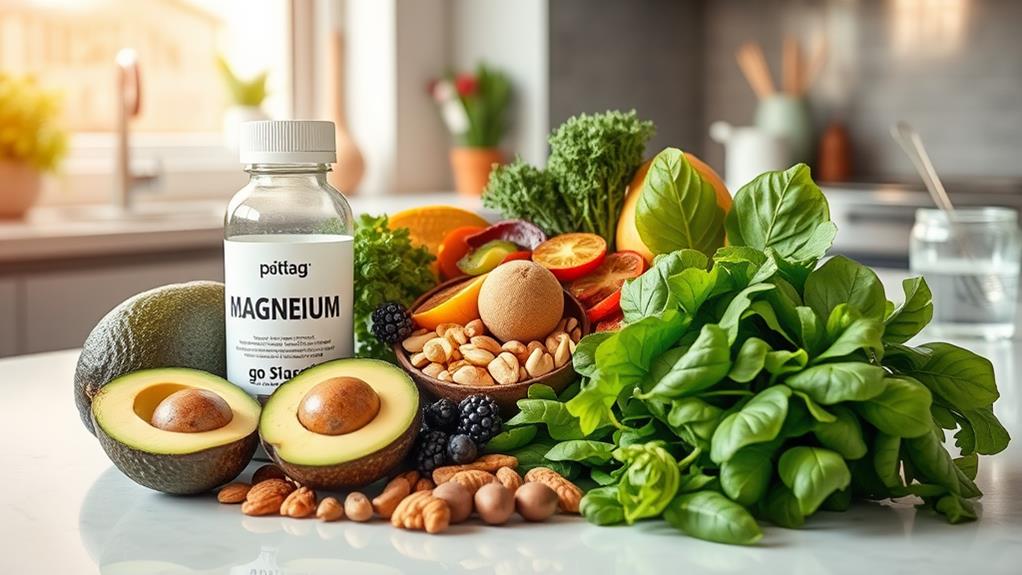
Just as potassium is essential for those on a ketogenic diet, magnesium also plays a significant role in maintaining overall health and well-being. Magnesium benefits are vast; it supports muscle function, energy production, and helps regulate blood sugar levels, which can be particularly tricky on a low-carb diet.
Without enough magnesium, keto dieters might face issues like muscle cramps, fatigue, and even insomnia. Yikes!
One of the challenges is that many high-carb foods, which people cut out on keto, are also rich in magnesium. Fortunately, there are plenty of keto-friendly magnesium food sources. Think leafy greens like spinach, crunchy nuts like almonds, seeds, and even fatty fish like salmon. These foods can help you hit your daily magnesium target.
The recommended daily allowance (RDA) for magnesium is about 400-420 mg for men and 310-320 mg for women. Given the restrictions of a strict keto diet, getting enough magnesium from food alone can be tough.
Supplementing might be necessary to keep everything in balance. Plus, magnesium can help alleviate those pesky "keto flu" symptoms, making your shift into ketosis smoother and boosting your overall energy levels.
Best Electrolyte Supplements
Steering through the myriad of electrolyte supplements available can be intimidating, but certain products stand out for their efficacy and keto-friendly formulations.
LMNT Electrolyte Drink Mix is a top pick, offering a balanced blend of sodium, potassium, and magnesium without sugars or carbs. This helps with electrolyte absorption, ensuring your body stays well-hydrated without kicking you out of ketosis.
Dr. Berg's Electrolyte Powder focuses on high potassium content, which is essential for combating the dreaded keto flu. This supplement supports hydration strategies by providing the needed minerals without artificial ingredients.
For those who prefer convenience, Hi-Lyte Electrolyte Capsules are an excellent choice. These capsules contain a balanced mix of essential electrolytes, making them easy to incorporate into your daily routine.
Keto Chow Electrolyte Drops offer a bioavailable blend of important electrolytes in a liquid form, perfect for adding to water. This makes staying hydrated on the go a breeze, without disrupting your diet.
Lastly, Swigg Electrolytes Powder Packets provide a sugar-free option in convenient daily packets. Designed to replenish essential minerals, these packets support both hydration and physical performance, making them a versatile choice for keto dieters.
Supplementation Tips
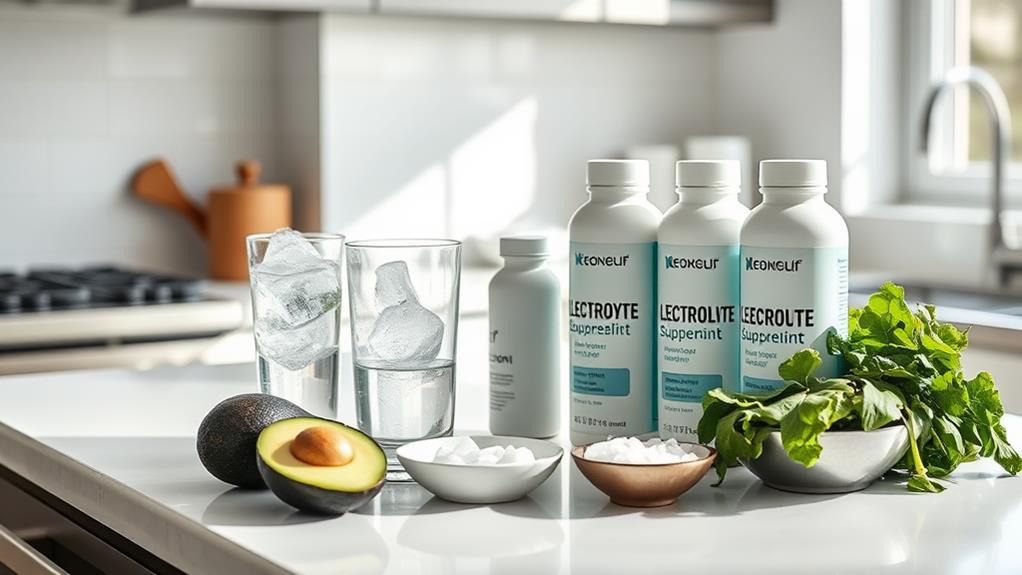
Selecting the right electrolyte supplement is only one part of maintaining your well-being on a keto diet; understanding how to effectively incorporate these supplements into your routine is equally important.
Start by choosing low or no-carb options to stay in ketosis. Confirm the supplements have a balanced mix of sodium, potassium, and magnesium, which are critical for your health on a keto diet.
When it comes to electrolyte absorption, it's best to monitor your body's response. Begin with lower dosages to see how your body reacts, then adjust based on your activity level and diet. Aim for a daily intake of 3,000-4,000 mg of potassium and about 2,300 mg of sodium.
Dosage timing is also important. Spread your intake throughout the day to maintain consistent electrolyte levels and prevent any sudden drops.
Choose supplement forms that fit your lifestyle, whether it's powders, capsules, or liquids. Look for products with minimal artificial ingredients and fillers.
Monitoring Electrolyte Levels
Monitoring electrolyte levels is a critical aspect of maintaining health on a keto diet, as the low-carb intake can lead to deficiencies in sodium, potassium, and magnesium due to increased fluid loss and diuretic effects.
Keeping an eye on these levels can seem tricky, but it doesn't have to be. Using apps like Carb Manager can make electrolyte tracking easy, helping you guarantee your sodium, potassium, and magnesium levels stay in the healthy zone.
Paying attention to your body is also super important. If you start feeling muscle cramps, fatigue, or headaches, it might be a sign that your electrolytes are off-balance.
Regularly checking your blood pressure can also be a handy trick since big changes might mean you need to adjust your sodium or potassium intake.
Don't forget, staying hydrated is key! During workouts or on hot days, you sweat more, which means you lose more electrolytes.
That's when you need to up your hydration strategies—drink more water and maybe add an electrolyte supplement to your routine.
Frequently Asked Questions
How Do You Stay Hydrated on Keto?
To stay hydrated on keto, drink 8-10 cups of water daily, monitor dehydration symptoms, and incorporate electrolyte-rich foods like avocados and leafy greens. Use low-carb electrolyte supplements to replenish sodium, potassium, and magnesium levels efficiently.
What Is the Best Way to Get Electrolytes on Keto?
The best way to get electrolytes on keto involves consuming sodium-rich foods like sea salt, potassium from avocados, and magnesium from nuts. Supplementing with low-carb products and following hydration tips guarantees balanced electrolyte sources in ketosis.
Should You Drink Electrolytes Every Day on Keto?
Yes, maintaining electrolyte balance and daily hydration is essential on a keto diet to avoid symptoms like fatigue and muscle cramps. Daily electrolyte intake supports overall health, physical performance, and adherence to ketogenic dietary practices.
What Are the Best Hydration Drinks for Keto?
The best keto-friendly beverages for hydration include low-carb electrolyte powders like LMNT and Hi-Lyte, zero-sugar drinks, and homemade options combining water, Himalayan salt, and lemon juice. These hydration tips guarantee effective electrolyte balance without disrupting ketosis.
Conclusion
Maintaining proper electrolyte levels is essential for those on a keto diet to avoid symptoms of imbalance. Natural sources can help, but supplements often provide a more reliable intake, especially for sodium and magnesium. Choosing the best supplements and monitoring levels can guarantee hydration and overall well-being. By understanding the role of electrolytes and using supplements wisely, one can stay healthy and hydrated while enjoying the benefits of ketosis.
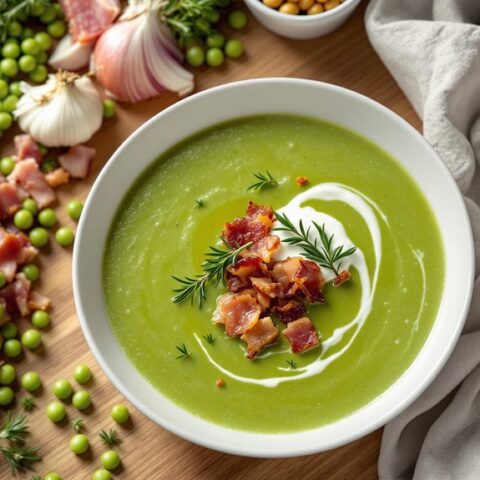

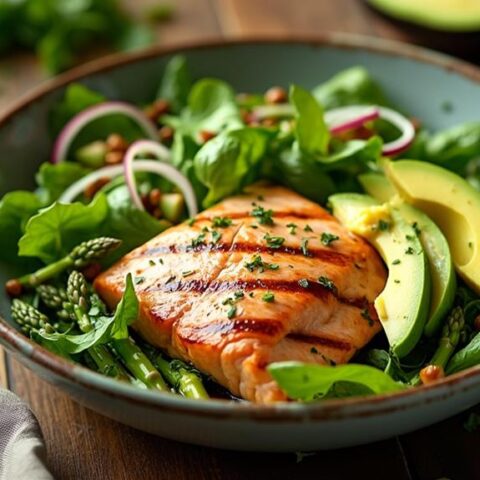
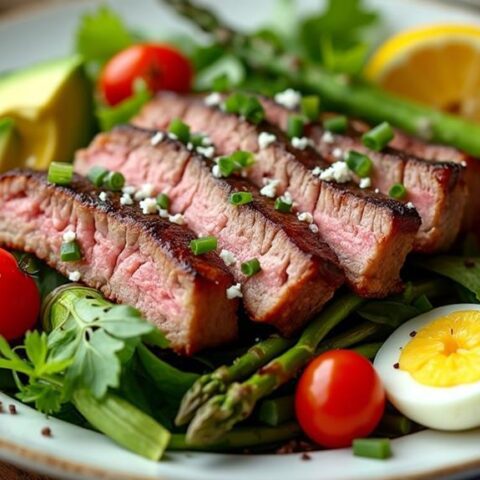

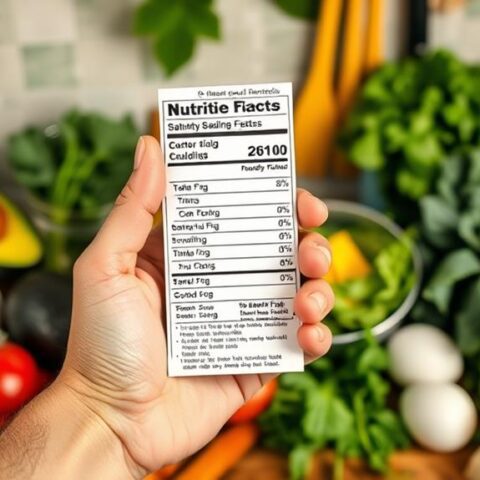




No Comments